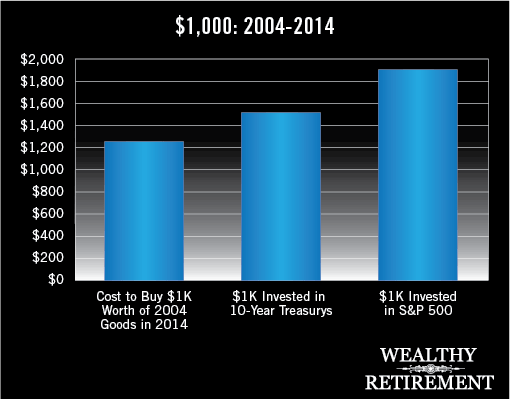 If you have kept your cash on the sidelines these past few years out of fear of another downturn like we experienced in 2008, how much money did you not make?
If you have kept your cash on the sidelines these past few years out of fear of another downturn like we experienced in 2008, how much money did you not make?
The market is up 185% since the bottom. That means, even if you had simply invested in an index fund, you likely would have tripled your money.
Of course, no one had the foresight to buy at the bottom.
But what if you just never sold at all? Or didn’t even worry about where the market was headed?
[ad#Google Adsense 336×280-IA]It seems that recently, every time I’m asked a question, whether it’s by the media, my colleagues or my family, it’s about when the bull market will end or if we’re at a top.
I’ve never seen so many people so worried about such a strong market.
The truth is, I don’t know if we’re at a top.
I don’t think we are, but I don’t know.
No one does.
But I do know that I don’t worry about it and neither should you.
Here’s why:
If the money you need in the next three years is invested in the market, take it out immediately. Not because I believe the market is headed lower (I don’t), but because that money shouldn’t be at risk. And if stocks do go lower, you may not have time to make it back.
If the money you need to pay the bills for the next few years is out of the market, it shouldn’t matter to you what the market does in the near term.
As far as the rest of your money, it also shouldn’t matter.
Talk with any financial expert and they’ll tell you, no matter what your asset allocation is, you’ve got to be invested for the long term. It’s the only way you’ll be able to grow your money and make it worth the higher amount you’ll need to live on in the future.
If you currently have more than enough to fund your retirement and want to crawl into a cave and not risk any of it, be my guest. It’s not what I would suggest, but at least you know your retirement is paid for.
But for the vast majority of people who are still trying to boost the value of their nest egg so that they can retire or live more comfortably, being scared of the market isn’t the way to do it.
Time Is on Your Side
Today, prices of most goods are up a little more than 25% from 10 years ago. So if you paid $1,000 for an item in 2004, today it costs roughly $1,255. Keep in mind, that’s using the government’s official inflation numbers. If you purchased things like food or healthcare in the past 10 years, you’re probably paying well over 25% more than you did in 2004.
But let’s use the government’s official numbers. If you were ultraconservative back then and refused to invest in the market and instead bought 10-year Treasurys, your $1,000 would be worth about $1,308 after taxes. So you’d be approximately $53 ahead.
However, if your $1,000 was invested in the S&P 500, today it would be worth $1,896. And that’s over a decade with lower-than-average performance. Both figures include interest payments/dividends and taxes.
Keep in mind, dividends receive a better tax treatment, currently taxed at 15% to 20% depending on your income level. Interest from Treasurys are taxed at your ordinary income tax rate, which is likely higher than the dividend tax rate.
 Also, remember that the market’s performance was hurt by a steep bear market and a near collapse of the financial system. Assuming that something like that won’t happen again for a while, the market’s performance over the next 10 years should be better.
Also, remember that the market’s performance was hurt by a steep bear market and a near collapse of the financial system. Assuming that something like that won’t happen again for a while, the market’s performance over the next 10 years should be better.
The historical 10-year average rolling return for the S&P 500 is 128%, including dividends. After taxes, that turns $1,000 into about $2,224. That beats the hell out of locking your money up in a bond at 2.5% for the next 10 years, doesn’t it?
The thing is, if you don’t invest, you will very likely not have enough money in retirement. Unless you’re a very high earner, it’s nearly impossible to save enough for 20 or 30 years of retirement and all of the expenses (particularly healthcare) that come with it.
The money that’s saved needs to grow. If you’re an especially nervous sort, put the money into a few broad index funds like the Vanguard Total Stock Market Index Fund (Nasdaq: VTSMX) or ETFs like the SPDR S&P 500 (NYSE: SPY). That will give you broad diversification and the investments should perform in line with the overall market.
If your time horizon is long term, you must invest. Otherwise, your money will not keep up with rising costs and you will lose your buying power over time.
— Marc Lichtenfeld
[ad#IPM-article]
Source: Wealthy Retirement
